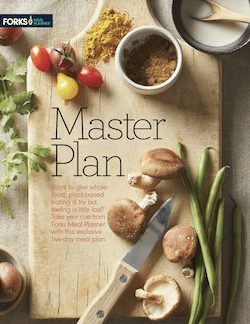
A Healthy Plant-Based Diet May Slow the Aging Process, New Study Finds
Among the sea of anti-aging products, treatments, and regimens currently on the market, there’s one daily habit that new research suggests actually works to slow the aging process: eating a healthy plant-based diet.
A recent study published in BMC Medicine found compelling evidence that people who consume a diet rich in whole plant foods may age slower than those who eat more animal products and ultraprocessed foods. The researchers looked at health data from more than 10,000 people over the age of 50 for eight years to determine how their diet impacted their biological age.
Biological age (the age of your cells) differs from chronological age (the amount of time you’ve been alive) and is gaining traction in scientific communities as a more accurate measurement for determining a person’s true age. Scientists are able to look at cells and determine whether they have entered senescence, a phase in cellular development where they lose the ability to regenerate and repair themselves. As we age, more of these defunct cells build up in our bodies and pave the way for age-related diseases. If you are exceptionally healthy, you may not have as many senescent cells as someone your age who’s in average health, thus making your biological age lower than the number of candles you’ll blow out on your next birthday cake.
Eating to Slow Down the Clock
Using a newly developed biological aging measure that factors in 14 key cellular biomarkers, the researchers identified three aging trajectories within the sample of participants: slow, medium, and high. They discovered that those who ate diets rich in fruits, vegetables, and legumes and low in animal products were more likely to be in the slow aging group and to have a lower overall mortality rate than those who ate more animal products and/or unhealthy plant-based foods.
To put it further into perspective, participants who consumed the most whole plant foods cut their risk of accelerated aging by about a third. In contrast, participants who followed an unhealthy plant-based dietary pattern were 70% more likely to fall into the fastest-aging group. Refined grains, salt-preserved vegetables, and dairy products were identified as potential key contributors to the higher aging scores of those who followed an unhealthy plant-based dietary pattern.
“We … found that adopting a plant-based dietary pattern, especially when rich in healthful plant foods, was associated with substantially lowered pace of aging,” concluded the study authors.
Several studies in recent years that have pointed to the age-defying benefits of a plant-based diet. A 2022 study concluded that adopting a plant-based diet could increase one’s lifespan by more than a decade. Another 2022 study found that mortality rates in older adults decreased when they ate a diet rich in healthy plant foods. And for those concerned about the aesthetic changes that come with aging, a study from 2020 found that a WFPB diet rich in antioxidants may slow skin aging.
To learn more about a whole-food, plant-based diet, visit our Plant-Based Primer. For meal-planning support, check out Forks Meal Planner, FOK’s easy weekly meal-planning tool to keep you on a healthy plant-based path.
Free Download
Free 5-day meal plan!
Get a taste for healthy, fuss-free meal planning with this free five-day meal plan from Forks Meal Planner!
By providing your email address, you consent to receive newsletter emails from Forks Over Knives. We value your privacy and will keep your email address safe. You may unsubscribe from our emails at any time.

About the Author

About the Author
Megan Edwards
Join our mailing list
Get free recipes and the latest info on living a happy, healthy plant-based lifestyle.
By providing your email address, you consent to receive newsletter emails from Forks Over Knives. We value your privacy and will keep your email address safe. You may unsubscribe from our emails at any time.
